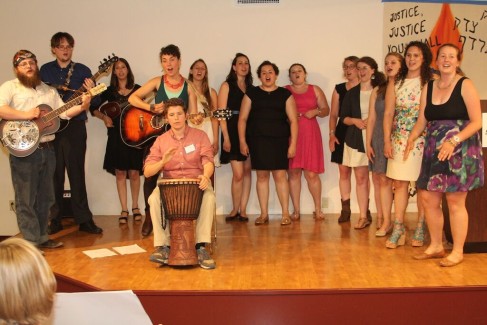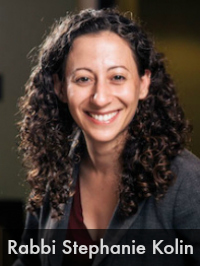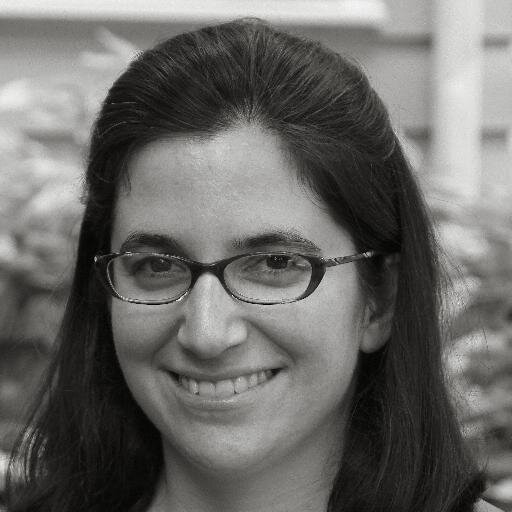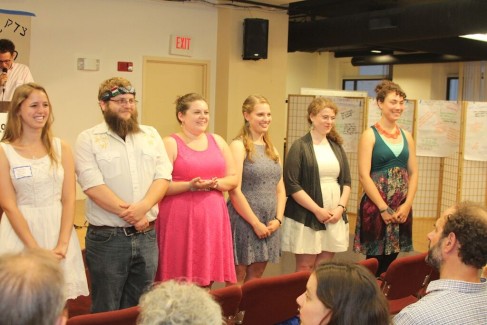On June 22, over 150 people gathered to celebrate with the 14 Fellows at JOIN for Justice’s Siyyum (Graduation). The evening was an incredible gathering to support our graduating 2015 Jewish Organizing Fellows. Below are JOIN’s Executive Director Karla Van Praag’s words of welcome at the Siyyum.

When I was 22, after becoming the first in my family to graduate college, I moved to Washington, DC. Years of sociology class and a fair bit of volunteer work had taught me how messed up the world was, and I was going to be part of the solution. I was offered a job with a service corps, where I was assigned as the team leader for the anti-hunger community service team. We would serve meals at soup kitchens, help people fill out food stamp applications, educate elementary school students about nutrition, and glean excess produce from the fields. I was excited to begin changing the world, alongside my peers who also wanted to do good work.
My team consisted of fifteen African American young adults aged 17-23 who were, unlike me, born and bred in DC. Everyone else, while working hard for the corps, was either raising young children, supporting other members of their family financially, meeting with parole officers, getting their GEDs, taking night courses at college, getting harassed by their landlords, or coming late to work when their bus never came to their neighborhood in Southeast, one of the poorest neighborhoods in DC. Meanwhile, once at work, the agency staff made obnoxious comments to me about how lazy “they” were, not always out of earshot.
It soon became painfully clear how the deck was stacked against my corps members. A history of slavery, and hundreds of years of racism, held a tight grip on my new friends’ lives. I realized though I had the degree, there was no clear way to fix these problems they were facing. No longer hopeful, now angry, I felt ill-equipped, out of place, and fully alone. I wasn’t sure what my role was as a white person with a different life experience, but didn’t want that to be an excuse to walk away, either – so I muddled along.
Now, multiply that confusion by all of today’s dedicated white people who seek to be allies but don’t know how. Not because anything new has happened, but because what has happened for generations happened again in Ferguson, Staten Island, Charleston and other places, and was finally more visible. This confusion particularly challenged American Jewish communities. Many of the American Jews who are white ached at the pain and injustice but weren’t sure how to get involved. Many American Jews of Color heard their fellow Jews grappling with how to relate to “other” communities and felt even more invisible.
When we see the horrors of police brutality and systemic racism on a daily basis, who do we turn to? What can we do?
I don’t have the answer for you. But I can suggest where to start.
As you’ll hear shortly in many of the stories, many of our fellows struggled with these same questions. Not surprisingly, being community organizers, many learned that their best hope was to lean into relationships, with leaders and members of non-Jewish communities as well as with each other.
Relationships can be scary. It comes with vulnerability, compromises, missteps, and unmet expectations. Choosing, in spite of that fear and confusion, to enter into relationships, since social change has never been achieved without it, requires – as the theme of tonight proclaims – boldly taking a step into the sea.
Jews have always known to draw upon each other and our collective wisdom when we’ve waded in, hoping the waters would part. Our traditions teach us to look at the stories of the past. They urge us to listen, to question, to challenge, to engage. Our own history as an oppressed people gives us insight what can happen. Our insider/outsider status has always given us a unique perspective in struggles for a just society. If we are part of a community larger than ourselves, we have a place to start. If we can relate to each other – white Jews and Jews of color alike – we can draw on our collective wisdom and relate well to non-Jewish communities and truly be allies in the struggle for justice.
Our Fellows rediscover this ancient and living community as a source of strength through the fellowship year. Young Jews come to our program out of frustration – about the injustices of the world, about the unsatisfactory efforts to address these problems, and often about the Jewish community itself. They see a gap in our world between what is and what should be. Where does their Jewish identity fit into their image of themselves as change agents? What skills and experiences can bridge the gap between their alienation and the ability to lead?
The Jewish Organizing Fellowship captures this familiar moment in generations of young people who are hungry to define their values and identity, and to confront the ills of our society. The Fellowship connects them to each other, to the Jewish community, and to experienced organizers wanting to invest in developing them. JOIN turns frustration, intention and raw talent into concrete skills and effective action. JOIN fills a niche where the interests of the Jewish community and our broader society meet.
These fellows carry the weight of our proud yet complicated history with race and privilege, the current insufficient action of a largely privileged Jewish community, all of it. They know that the Jewish community can do better and must do better, and they are angry about it, but they didn’t walk away, or freeze. This class, and those that came before them, stepped into the complexity and asked themselves how to organize to improve it.
Last Chanukah, responding to requests from African American leaders, hundreds of Jews marched on Brookline under the banner of “Jews Say Black Lives Matter.” That march was largely organized and led by our alumni and our fellows in partnership with Jews of color in our community. And our fellows have shown since then that that march was one moment in a long-term movement, not a one-shot to make a quickly forgotten statement, as you will hear in the stories they will share tonight. They organize not despite their Judaism, but because of it. And by taking responsibility to confront and challenge racism in this country, they will become the next generation of Jewish leaders.
Because of their training, their community, and their wisdom, I have more faith in these young people than I had in myself when I was 22, to know the right thing to do about all this. They have used this year to hold each other accountable, to stay committed to figure it out, to find the mentors to teach them, to determine who they need to be in relationship with and what risks they need to take. They are walking together until the sea parts. As they share their stories this evening, listen for the rushing sound of water. That will be the sea parting. When you hear that sound, let’s follow them through to the other side.



 The goal of the Auburn Senior Fellows program is to equip, platform, and network faith leaders who have great potential to catalyze and advance multifaith movements for justice.
The goal of the Auburn Senior Fellows program is to equip, platform, and network faith leaders who have great potential to catalyze and advance multifaith movements for justice. Today we are thrilled to feature an interview with Abby Levine, Director of the Jewish Social Justice Roundtable. The
Today we are thrilled to feature an interview with Abby Levine, Director of the Jewish Social Justice Roundtable. The 




